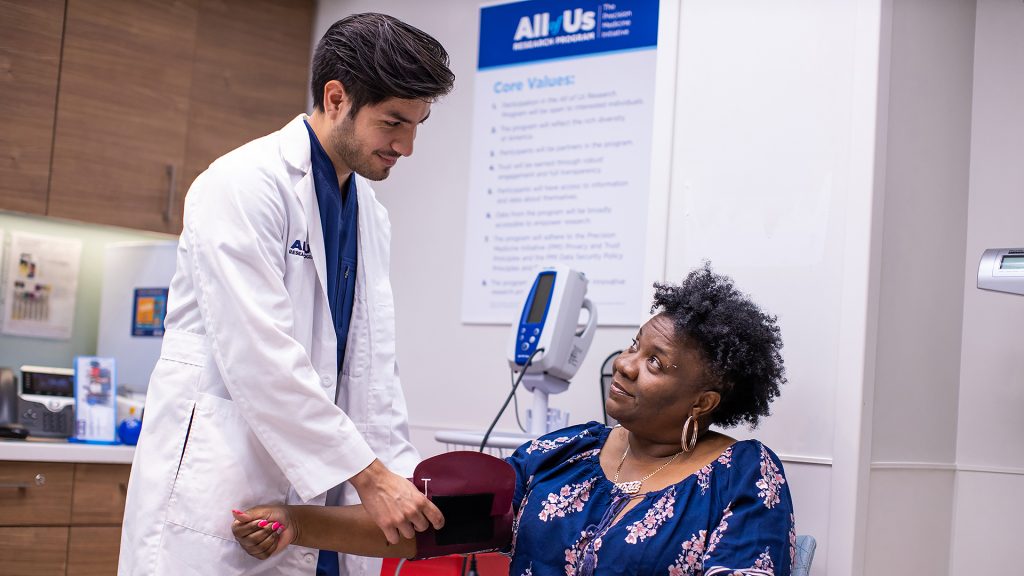NEWS | IHCC FEATURED COHORT
All of Us Research Program Provides Unprecedented Platform for Health Discoveries
Precision medicine effort leverages diverse participant base and robust data to drive new research

By: Geoffrey Ginsburg, M.D., Ph.D., chief medical and scientific officer of the All of Us Research Program and co-chair of the International HundredK+ Cohort Consortium; and Sheri Schully, Ph.D., deputy chief scientific and medical officer of the All of Us Research Program
The National Institutes of Health’s All of Us Research Program has made its initial genomic data available to researchers, bringing nearly 100,000 whole genome sequences onto its data analysis platform, the Researcher Workbench. The genomic data is available to registered researchers alongside clinical, lifestyle, and wearable data. This combination of data allows scientists to better understand how genes can cause or influence diseases in the context of other health determinants to ultimately enable more precise approaches to care for all populations.
All of Us’ dataset represents an unprecedented level of diversity, with about 45% of the data coming from individuals who identify with racial or ethnic groups that have historically been underrepresented in research. In the past, many communities, including racial and ethnic minorities, those who live in rural areas, and LGBTQ+ people, have often been left out of biomedical research. As a result, we know less about the health of those historically underrepresented in medical research and ways to provide them with the best care, resulting in potentially less effective prevention and treatment strategies. This lack of diversity has been especially evident in genomic studies, where more than 90% of participants of genome-wide studies worldwide come from European ancestry.
The program’s data browser offers a summary view of genetic data from participants. Using this tool, anyone can search for specific genes or variants and see aggregate counts of their frequency in the All of Us dataset and the genetic ancestry of participants with each variant. More than 593 million unique variants are represented and searchable through this public data browser. Additionally, we’ve observed 100 million genetic variants in this initial dataset that are not currently in some of the other larger databases available. This is thanks in large part to our diverse participant cohort.
This summer, the program plans to add responses from its new social determinants of health (SDOH) survey, offering insights into how lived experiences affect health. This data will include participant-responses related to neighborhood safety, access to food, experiences with health care discrimination, and daily work and living environments. These responses to the SDOH participant survey can be paired with select data from the Census Bureau’s American Community Survey, linked to participants’ first three digits of their zip code, as well as responses from other surveys on health care access, lifestyle, social support, and discrimination.
Our survey instruments and the source materials are available for the research community to reference and use from our Research Hub.
The Researcher Workbench is designed to support broad access for researchers across varied settings and career stages. The goal is to facilitate greater equity so more researchers and different kinds of organizations can collaborate to gain insights that can benefit diverse communities. The platform currently supports more than 2,300 registered researchers, with more than 1,700 active projects. Nearly 85% of registered researchers consider themselves early-career researchers or are in similar roles, and nearly 55% identify with a group that is underrepresented in the biomedical research workforce.
At this time, any U.S.-based academic, nonprofit, or health care organization can enter into a data use agreement with the program. We are eager to open the Researcher Workbench more broadly and are actively working to do that as fast as we can.
To learn more about the All of Us Researcher Workbench, or to register for access, go to www.ResearchAllofUs.org.To learn more about getting involved as a research participant, visit JoinAllofUs.org.





